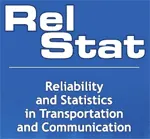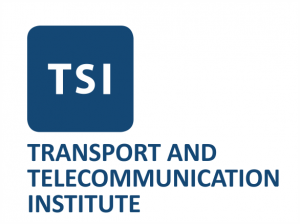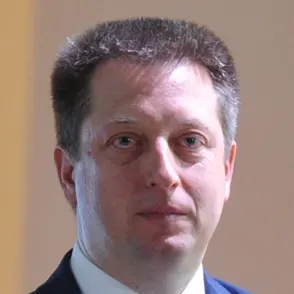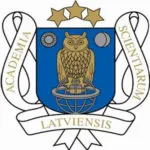RelStat-2022
Reliability and Statistics in Transportation and Communication (RelStat-2022).
 The goal of the RelStat-2022 conference is to provide an international forum for scientists and professionals in academia, industry, and government to address recent research results and to present and discuss their ideas, theories, technologies, systems, tools, applications, work in progress and experiences on all theoretical and practical issues arising in transport, information and communication technologies.
The goal of the RelStat-2022 conference is to provide an international forum for scientists and professionals in academia, industry, and government to address recent research results and to present and discuss their ideas, theories, technologies, systems, tools, applications, work in progress and experiences on all theoretical and practical issues arising in transport, information and communication technologies.
RelStat-2022 has opened Call for Papers for both Special Session Proposals and Regular Full Paper Submissions. We look forward to innovative contributions in any of the following areas:
- Smart Solutions in Transportation Systems
- Networking and Telecommunications
- Reliability, Risk and Safety Applications
- Mathematics, Statistics, Modelling and its Applications
- Information Systems and Information Technologies
- Business and Economics Applications
- Mobile and Distance Education
English is the official language of the Conference.
PUBLICATIONS
Selected papers will be published in the conference proceedings by Springer Lecture Notes in Networks and Systems, indexed in SCOPUS. Submitted papers must not substantially overlap with papers that have been published or submitted for a publication anywhere else.
Proceedings of the previous conferences:
- RelStat-2021, Lecture Notes in Networks and Systems book series, Springer https://link.springer.com/book/10.1007/978-3-030-96196-1
- RelStat-2020, Lecture Notes in Networks and Systems book series, Springer https://link.springer.com/book/10.1007/978-3-030-68476-1
Invited Sessions (workshops)
Proposals for invited sessions (workshops) within the technical scope of the conference are accepted. Each proposal should describe the theme and scope of the proposed session. The proposal should contain the title and theme of the session, moderator and a list of paper titles, names and email addresses of the corresponding authors.

Sponsored and hosted by Transport and Telecommunication Institute (Latvia)
Transport and telecommunication institute (TSI) – is a modern university with the almost centennial history. TSI – is the university-successor of the legendary RKIIGA (Riga Red-Banner Civil Aviation Institute) and RAU (Riga Aviation Institute).
In the present-day appearance TSI was established in 1999. Nowadays TSI – is the only one private technical college university type in Latvia, where you can get higher education in Russian, Latvian and English languages.
Prof. Igor Kabashkin, Transport & Telecommunication Institute, Latvia – Chairman
Prof. Irina Yatskiv (Jackiva), Transport & Telecommunication Institute, Latvia – Co-Chairman
Prof. Irina Kuzmina-Merlino, Transport and Telecommunication Institute, Latvia – Co-Chairman
Assoc. prof. Giedrė Adomavičienė, Kaunas University of Applied Engineering Sciences
Prof. Lutfihak Alpkan, Gebze Institute of Technology, Turkey
Univ.-Prof. Dr. Constantinos Antoniou, Technical University of Munich, Germany
Prof. Liudmyla Batenko, Kyiv National Economic University named after Vadym Hetman, Ukraine
Prof. Maurizio Bielli, Institute of System Analysis and Informatics, Italy
Dr. Brent D. Bowen, Purdue University, USA
Dr. Ilia B. Frenkel, Industrial Engineering and Management Department, Sami Shamoon College of Engineering, Israel
Assoc. prof. Lina Girdauskienė, Kaunas University of Applied Engineering Sciences
Prof. Alexander Grakovski, Transport and Telecommunication Institute, Latvia
Prof. Stefan Hittmar, University of Zilina, Slovakia
As. Prof. Ishgaly Ishmuhametov, Transport and Telecommunication Institute, Latvia
Prof. Dr. Nicos Komninos, Aristotle University of Thessaloniki, Greece
Dr. Gatis Krumins, Vidzemes Augstskola, University of Applied Sciences, Latvia
Prof. Natalja Lace, Riga Technical University, Latvia
As.Prof. Nikolova Christina Lazarova, University of National and World Economy, Bulgaria
As. Prof. Jacek Mazurkiewicz, Wroclaw University of Technology, Poland
Prof. Boriss Misnevs, Transport and Telecommunication Institute, Latvia
Prof. Dr. Andres Monzon de Caceres, Universidad Politécnica de Madrid, Spain
As. Prof. Eftihia Nathanail, University of Thessaly, Greece
Prof. Andrzej Niewczas, Lublin University of Technology, Poland
Prof. Lauri Ojala, Turku School of Economics, Finland
Prof. Ramunas Palšaitis, Vilnius Gediminas Technical University, Lithuania
Prof. Dmitry Pavlyuk, Transport and Telecommunication Institute, Latvia
Prof. Gunnar Prause, Tallinn Technical University, Estonia
Prof. Cristina Pronello, Polytechnic Torino, Italy
Prof. Olegas Prentkovskis, Vilnius Gediminas Technical University, Lithuania
Prof. Klaus Richter, Fraunhofer Institute for Factory Operation and Automation IFF Magdeburg, German
Prof. Svetlana Saksonova, University of Latvia, Latvia
Prof. Mihails Savrasovs, Transport and Telecommunication Institute, Latvia
Dr. Paulius Skačkauskas, Vilnius Gediminas Technical University, Lithuania
As. Prof. Ilze Sproge, Transport and Telecommunication Institute, Latvia
Prof. Inna Stetsenko, Transport and Telecommunication Institute, Latvia
Prof. Julia Stukalina, Transport and Telecommunication Institute, Latvia
Prof. Juri Toluyew, Transport and Telecommunication Institute, Latvia
Prof. Tatjana Volkova, BA School of Business and Finance, Latvia
Prof. Edmundas Zavadskas, Vilnius Gediminas Technical University, Lithuania
Prof. Irina Yatskiv, Latvia – Chairman
Prof. Igor Kabashkin, Latvia
Prof. Irina Kuzmina-Merlino, Latvia
Prof. Dmitry Pavlyuk, Latvia
Asoc. Prof. Nadezda Spiridovska, Latvia
Mrs. Viktorija Gruzite, Latvia – Organization Manager
Transport and Telecommunication Institute
Lomonosova 1, Riga, LV-1019, Latvia
E-mail: RelStat@tsi.lv
Participation
Step 1. Prepare your abstracts using the template and submit them using Easychair until 03-May-2022
Step 2. On abstract acceptance, prepare the full paper in Springer LNCS Format and submit it using Easychair until 10-Jul-2022
Step 3. On paper acceptance, pay the conference fee.
Step 4. Register before attending the conference.
Conference topics
Special Topic: all aspects of Artificial Intelligence, applied in the Transportation domain
- Different modes of transport and their interactions
- Intelligent transport systems
- Design, operation, modelling and management of logistics systems and freight transport
- Transport policy, planning, design and management
- Environmental issues, road pricing, security and safety
- Transport systems operation
- Application and management of new technologies in transport
- Travel demand analysis, prediction and transport marketing
- Info mobility
- Ubiquitous transport technologies and ambient intelligence
- Pedestrian and crowd simulation and analysis
- Urban planning toward sustainable mobility
- Service oriented architectures for vehicle-to-vehicle and vehicle-to-infrastructure communications
- Assessment and evaluation of intelligent transportation technologies
- Human factors in intelligent vehicles
- Autonomous driving
- Artificial transportation systems and simulation
- Surveillance and monitoring systems for transportation and pedestrians
- Transport logistics and transportation management
- Smart cities and sustainable development of transport
- Telecommunication and Networking
- Telecommunication Systems and Evaluation
- Multiple Criteria Decision Making in Information Technology
- Network and Decision Making
- Networks and Security
- Network and system monitoring and management
- Feature interaction detection and resolution
- Policy based monitoring and managements systems
- Traffic modelling and monitoring
- Traffic engineering and management
- Emerging networking, tracking and sensing technologies
- Internet of Things (IoT)
- Risk and hazard analysis
- System reliability analysis
- Monte Carlo methods in system safety and reliability
- Dynamic reliability
- Bayesian methods
- Reliability and safety data collection and analysis
- Fault identification and diagnostics
- Maintenance modelling and optimisation
- Structural reliability and design codes
- Software security, reliability and safety
- Safety culture
- Human factors in reliability and security
- Accident and incident investigation
- Occupational safety
- Decision support systems and software tools for safety and reliability
- Safety management systems
- Integrated risk management and risk-informed decision-making
- Stakeholder and public involvement in risk governance
- Risk and evidence based policy making
- Risk control in complex environments
- Risk perception and communication
- Major disasters and public health
- Crisis and emergency management
- Legislative dimensions of risk management
- Theory and applications of reliability and statistics
- Reliability and safety of transport systems
- Reliability and cyber security
- Rare events and risk management
- Formal aspects of security
- Systems and network security
- Security and cryptography, applied cryptography
- Security management, protection management, certification and accreditation
- Numerical analysis and scientific computing
- Statistics, probability theory and stochastic processes
- Operations research, mathematical programming and game theory
- Limit theory
- Mathematical finance and turbulence
- Descriptive Statistics
- Inferential Statistics / Statistical Inference
- Statistics in Society
- Applied and Interdisciplinary Statistics
- Computational and Graphical Statistics
- Spatial Statistics
- Data Management and Data Analysis
- Correlation Analysis
- Regression Analysis
- Continuous and discrete models
- Optimal models
- Complex system modelling
- Compact fuzzy models
- Real-time modelling
- Performance modelling
- Decision support systems
- Multiple criteria decision making
- Problem structuring methods
- Multicriteria optimization
- Optimization and efficiency
- Extreme optimization, combinatorial optimization, discrete optimization, fuzzy optimization
- Complexity analysis
- Global optimization
- Software development for modelling and optimization
- Multimedia and social computing
- Service oriented computing for systems & applications
- Smart environments and applications
- Industrial applications
- Information technology and organizational behavior
- Agents, data mining and ontologies
- Big data and analytics
- Agent systems, intelligent computing and applications
- Cloud computing
- Information and network security
- Organizational information systems, information fusion, information management systems;
- Content consumer it applications for mobile platforms
- New ICT based applications in the digital society
- Management information systems
- Decision support systems
- Enterprise application integration
- Enterprise resource planning, business process change
- Design and development methodologies and frameworks
- Risk management in information systems design and development
- Modelling techniques, tools, methodologies, languages
- Enabled applications through virtualization
- Small-scale and large-scale virtualization methodologies and techniques
- Virtual reality and augmented reality. Tools and applications
- Management of virtualized systems. Platforms, tools, environments, and case studies
- Software requirements engineering
- Software design, frameworks, and architectures
- Formal methods for software development, verification and validation
- Neural networks and performance
- Empirical software evaluation metrics
- Software economics
- Real-time and embedded software
- Open source software development methodologies
- Software tools and deployment environments
- Software intelligence
- Software performance and evaluation
- Transport economics and transport policy
- Transportation innovation and cost management
- Sustainability and corporate responsibility
- Financial and business performance
- Business scenarios and strategic planning
- Consumer dynamics
- Economic indicators and forecasting
- Energy and sustainability
- Global value chains
- Growth, productivity and competitiveness
- Innovation
- Labor markets
- Marketing and brand strategy
- Procurement and supply chain strategy
- Urban, rural and regional economics
- Econometrics
- Accounting
- Behavioral, health and experimental economics
- Managerial competencies in the Digital Era
- Performance Management
- Organisational behaviour
- Leadership in a VUCA world
- Digital enterprise
- Educational technologies
- Distance learning and E-learning;
- Mobile learning, cognitive support for learning
- Impact of ICT on education and society
- Contextual and cultural challenges in user mobility
- Learning process of digital nationality
- E-learning and M-learning function in higher education
Tutorial
Special Session “Intelligent Supply Chain Ecosystem” in frame of the Project “Enhanced Physical Internet-Compatible Earth-friendly freight Transportation answer” (ePIcenter) is announced.
Invited speakers
Meet our invited speakers

DR. ENRIQUE ONIEVA
Professor, Vice-Dean for International Relationships and Online Teaching, Deusto, Spain

PROF. DR. WALTER NEU
Institute of Hyperloop Technology, Board of Directors, University of Applied Sciences Emden/Leer

VLADISLAV CHASCHIN
Deputy Head of Technical Department, SJSC "Latvijas gaisa satiksme", Latvia

JELENA POPOVA
Associate Professor, Transport and Telecommunication Institute, Latvia
PRESENTATIONS
ARE EXPECTED
Conference Rates
Hurry up and use the Early Bird offer
Physical (in-person) participation
Full Early Bird (valid until 31.08.2022)
€350
✓ Admission to all sessions
✓ Hard copy of Abstracts
✓ Publication in Conference Proceedings
✓ Coffee breaks
✓ Daily launch
✓ Welcome Party
✓ Conference Dinner
Full (after 31.08.2022)
€450
✓ Admission to all sessions
✓ Hard copy of Abstracts
✓ Publication in Conference Proceedings
✓ Coffee breaks
✓ Daily launch
✓ Welcome Party
✓ Conference Dinner
Accompanying Person
€100
✓ Admission to all sessions
✓ Coffee breaks
✓ Daily lunch
✓ Welcome Party
✘ Presentation
✘ Publication paper
✘ Conference Dinner
Online participation
Online Early Bird (valid until 31.08.2022)
€250
✓ Admission to all sessions
✓ Abstracts (online)
✓ Publication in Conference Proceedings
✘ Welcome Party
✘ Coffee breaks
✘ Daily launch
✘ Conference Dinner
Online (after 31.08.2022)
€350
✓ Admission to all sessions
✓ Abstracts (online)
✓ Publication in Conference Proceedings
✘ Welcome Party
✘ Coffee breaks
✘ Daily launch
✘ Conference Dinner
Special Offers
Topic Waiver: AI in Transportation*
€300
✓ Admission to all sessions
✓ Hard copy of Abstracts
✓ Publication in Conference Proceedings
✓ Coffee breaks
✓ Daily launch
✓ Welcome Party
✓ Conference Dinner
First Delegate **
€300
✓ Admission to all sessions
✓ Hard copy of Abstracts
✓ Publication in Conference Proceedings
✓ Coffee breaks
✓ Daily launch
✓ Welcome Party
✓ Conference Dinner
Student ***
€250
✓ Admission to all sessions
✓ Hard copy of Abstracts
✓ Publication in Conference Proceedings
✓ Coffee breaks
✓ Daily launch
✓ Welcome Party
✓ Conference Dinner
* Topic Waiver is applied for contributions on Artificial Intelligence in Transportation. Please indicate this waiver during the submission process
** First Delegate Waiver is applied for the first (in the history of RelStat) participant from a university / research institution
*** Student waiver is applied if the first author and presenter is MSc or PhD student
Please note that one conference fee covers one paper in the Proceedings. An author who has submitted more than one paper has to pay additional costs of 50% for each next paper, unless a co-author has already registered and paid the full registration fee.
We can also agree for 1\2 extra pages in your paper. Each extra page costs 20 EURO.
Submission Guidelines
Abstract Submission: 30 May 2022
Special Session Proposals: 30 May 2022
Notification of Abstract Acceptance: 15 June 2022
Full Paper Submission: 10 July 2022
Notification of Paper Acceptance: 10 August 2022
Early Registration and Payment: 31 August 2022
Final Manuscript Submission: 31 August 2022
Paper submission
Each paper should clearly indicate the nature of its technical/scientific contribution, and the problems, domains or environments to which it is applicable, addressing one or several of the conference areas or topics. Only original papers should be submitted.
Authors should submit a paper in English (British), checked for correct grammar and spelling.
Submitted abstracts and papers will be double-blind peer reviewed.
Papers that contain any form of plagiarism will be rejected without reviews. Authors are advised must make sure that their submissions do not substantially overlap work which has been published elsewhere or simultaneously submitted to a journal or another conference with proceedings.
Before submitting a manuscript, please read the information for authors in section Formatting of this website. Please do not submit your paper until it satisfies the requirements of formatting. The templates could also be found in the section Formatting.
Please use this link to submit your manuscript (if you do not have an EasyChair profile, sign up)
Invited Sessions
Proposals for invited sessions (workshops) within the technical scope of the conference are accepted. Each proposal should describe the theme and scope of the proposed session. The proposal must contain the title and theme of the session, moderator and a list of paper titles, names and email addresses of the corresponding authors.
Abstracts
Abstracts (not more than 600 words in length) submitted for review should be in English and should present a clear and concise view of the motivation of the subject, give an outline, and include information on all authors (the full name, affiliation, address, telephone number, fax number, and e-mail address of the corresponding author).
Using these templates is strongly advised to all authors submitting an abstract for reviewing:
Papers
Submission: Papers should be maximum 10 pages long, including references, tables, graphs, images and appendices. Authors may increase the total number of pages by a maximum of 5 extra pages, for an additional fee 20 Euro per page. Submissions with less than 4 pages or more than 10 pages (or 15 pages with additional payment) will be automatically rejected.
The total number of pages to consider is the number obtained after the paper has been correctly formatted according to the appropriate template.
Acceptance: After a double-blind peer review, qualifying Papers may be accepted.
Publication:
Papers will be selected based on their originality, timeliness, significance, relevance, and clarity of presentation. Submission of a paper should be regarded as a commitment that, should the paper be accepted, at least one of the authors will register and attend the conference to present the work.
Submitted papers must not substantially overlap with papers that have been published or that are simultaneously submitted to a journal or to another conference with proceedings.
Papers must be clearly presented in English (British), and in Springer LNCS Format (http://www.springer.com/gp/computer-science/lncs/conference-proceedings-guidelines ) with Microsoft Word Proceedings Templates (zip) (https://resource-cms.springernature.com/springer-cms/rest/v1/content/19238706/data/v1) .
Presentation
Please use the recommended presentation template (.pptx) for presentations at the Conference and refer it for additional information
Name of account holder: Transport and Telecommunication Institute
Address of account holder: Lomonosova 1, Riga, LV-1019, Latvia
VAT (tax) registration number: LV40003458903
Name of the Bank: Swedbank
SWIFT: HABALV22
Address of the Bank: Balasta dambis 1a, Riga, LV-1048, Latvia
IBAN: LV06HABA0551032952167
Purpose: RelStat 2022 [Author_Surname]
Previous RelStat conference Editions
The 21th International Multidisciplinary Conference “Reliability and Statistics in Transportation and Communication” (RelStat-2021) was held remotely on 13-16 October 2021.
The 20th International Multidisciplinary Conference “Reliability and Statistics in Transportation and Communication” (RelStat-2020) was held remotely on 14-17 October 2020.
Gallery
check our previous conference RelStat-2019 photos
Our Partners
these companies support us
Contacts
 Riga, Latvia
Riga, Latvia
Riga is the capital of the Republic of Latvia. Thanks to its geographical location, Riga has wonderful trade, cultural and tourist facilities. Whilst able to offer all the benefits of a modern city, Riga has preserved its historical charm. It’s especially famous for its medieval part – Old Riga.
Old Riga still preserves many mute witnesses of bygone times. Its old narrow streets, historical monuments, organ music at one of the oldest organ halls in Europe attract guests of our city. In 1998 Old Riga was included into the UNESCO list of world cultural heritage.
TSI – Transport and Telecommunication Institute
1 Lomonosova Street, LV-1019, Riga, LATVIA
Contacts:
Jelena Rutkovska : +371 67100586
 Transport and Telecommunication Institute (Transporta un Sakaru Institūts)
Transport and Telecommunication Institute (Transporta un Sakaru Institūts)
1 Lomonosov street, Riga, LV1019, Latvia
A wide range of hotels will be at the disposal of participants of the conference and accompanying persons (http://eng.meeting.lv/hotels/latvia_hotels.php).
Mrs. Viktorija Gruzite – Organization Manager
Transport and Telecommunication Institute
Lomonosova 1, Riga, LV-1019, Latvia
Telephone: +371-67100586, +371-67100651
Fax: +371-67100660
E-mail: RelStat@tsi.lv



